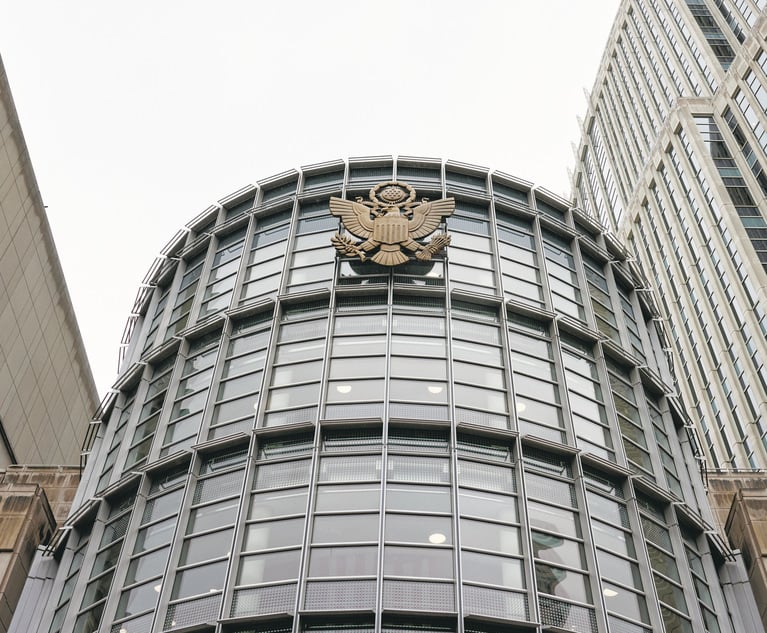UCC Mezzanine Loan Collateral Sales: Commercial Reasonableness During COVID
During the past few months several New York cases involving UCC sales of equity pledged to secure mezzanine loans have underscored whether the concept of commercial reasonableness may apply differently during the COVID-19 pandemic.
December 15, 2020 at 11:45 AM
8 minute read
 During the past few months several New York cases involving UCC sales of equity pledged to secure mezzanine loans have underscored whether the concept of commercial reasonableness may apply differently during the COVID-19 pandemic. A typical mezzanine real estate loan structure involves a loan made to a mezzanine borrower that owns all of the equity interests in a special purposes entity (often a limited liability company) that in turn owns a commercial real estate property. The mezzanine borrower pledges its equity interest in the property owner as collateral to secure the mezzanine loan. When a default arises under the mezzanine loan the lender may seek to sell its collateral under the UCC, provided, however, that every aspect of a disposition of collateral, including the method, manner, time and place and other terms of sale must be commercially reasonable. See N.Y. U.C.C. §9-610(b)
During the past few months several New York cases involving UCC sales of equity pledged to secure mezzanine loans have underscored whether the concept of commercial reasonableness may apply differently during the COVID-19 pandemic. A typical mezzanine real estate loan structure involves a loan made to a mezzanine borrower that owns all of the equity interests in a special purposes entity (often a limited liability company) that in turn owns a commercial real estate property. The mezzanine borrower pledges its equity interest in the property owner as collateral to secure the mezzanine loan. When a default arises under the mezzanine loan the lender may seek to sell its collateral under the UCC, provided, however, that every aspect of a disposition of collateral, including the method, manner, time and place and other terms of sale must be commercially reasonable. See N.Y. U.C.C. §9-610(b)
Executive Orders Barring Residential and Commercial Foreclosures
Pursuant to a number of executive orders, New York state barred residential and commercial foreclosures for an initial period of 90 days to June 20, 2020 and subsequently extended that time period to Jan. 1, 2021 (the Executive Orders). These Executive Orders, however, did not expressly bar UCC sales of collateral but the rationale for such orders was considered and/or implicitly adopted by courts in connection with UCC sales.
'D2 Mark'
The decision by the court in D2 Mark v. Orei VI Investments, may be the first time in New York that a preliminary injunction preventing a UCC collateral sale has been granted in connection with a mezzanine loan. The court found that the sale procedures that were implemented and proposed were not commercially reasonable under the current circumstances of the pandemic. One other key factor considered by the court was language in the mezzanine loan agreement which the court interpreted as limiting the borrower's remedies to injunctive relief and therefore precluded monetary damages. This interpretation allowed the court to find irreparable harm as part of the court's preliminary injunction analysis. Whether the court's interpretation of this language was correct is subject to debate. The lender argued that the language in question that limited the borrower's remedies to injunctive relief was itself limited to the lender's failure to grant consents—and did not apply to sales under the UCC, so that damages would, in fact, be available. However, the court did not accept that argument.
This content has been archived. It is available through our partners, LexisNexis® and Bloomberg Law.
To view this content, please continue to their sites.
Not a Lexis Subscriber?
Subscribe Now
Not a Bloomberg Law Subscriber?
Subscribe Now
NOT FOR REPRINT
© 2025 ALM Global, LLC, All Rights Reserved. Request academic re-use from www.copyright.com. All other uses, submit a request to [email protected]. For more information visit Asset & Logo Licensing.
You Might Like
View All
Disbarred NY Atty Receives 54-Month Prison Sentence After $3M Embezzlement
3 minute read
Unit Owners Sued Board for Failure To Maintain Adequate Fire Insurance: This Week in Scott Mollen’s Realty Law Digest


Law Firms Mentioned
Trending Stories
- 1Retention, Development and 'Empowering Teams': This Am Law 200 Firm's Newest Practice Leader Says Objectives Haven't Changed
- 2From Laggards to Tech Founders: Law Firm Innovation Is Flourishing
- 3Judge Receives Supreme Court Reprimand: 'Your Behavior Was Unacceptable'
- 4Contracts Game Changer? One-Sided ADR Provision Overturned
- 5Attorney Says Seeking Justice for Inmate's Death Requires Systemic Change as Well as Compensation
Who Got The Work
J. Brugh Lower of Gibbons has entered an appearance for industrial equipment supplier Devco Corporation in a pending trademark infringement lawsuit. The suit, accusing the defendant of selling knock-off Graco products, was filed Dec. 18 in New Jersey District Court by Rivkin Radler on behalf of Graco Inc. and Graco Minnesota. The case, assigned to U.S. District Judge Zahid N. Quraishi, is 3:24-cv-11294, Graco Inc. et al v. Devco Corporation.
Who Got The Work
Rebecca Maller-Stein and Kent A. Yalowitz of Arnold & Porter Kaye Scholer have entered their appearances for Hanaco Venture Capital and its executives, Lior Prosor and David Frankel, in a pending securities lawsuit. The action, filed on Dec. 24 in New York Southern District Court by Zell, Aron & Co. on behalf of Goldeneye Advisors, accuses the defendants of negligently and fraudulently managing the plaintiff's $1 million investment. The case, assigned to U.S. District Judge Vernon S. Broderick, is 1:24-cv-09918, Goldeneye Advisors, LLC v. Hanaco Venture Capital, Ltd. et al.
Who Got The Work
Attorneys from A&O Shearman has stepped in as defense counsel for Toronto-Dominion Bank and other defendants in a pending securities class action. The suit, filed Dec. 11 in New York Southern District Court by Bleichmar Fonti & Auld, accuses the defendants of concealing the bank's 'pervasive' deficiencies in regards to its compliance with the Bank Secrecy Act and the quality of its anti-money laundering controls. The case, assigned to U.S. District Judge Arun Subramanian, is 1:24-cv-09445, Gonzalez v. The Toronto-Dominion Bank et al.
Who Got The Work
Crown Castle International, a Pennsylvania company providing shared communications infrastructure, has turned to Luke D. Wolf of Gordon Rees Scully Mansukhani to fend off a pending breach-of-contract lawsuit. The court action, filed Nov. 25 in Michigan Eastern District Court by Hooper Hathaway PC on behalf of The Town Residences LLC, accuses Crown Castle of failing to transfer approximately $30,000 in utility payments from T-Mobile in breach of a roof-top lease and assignment agreement. The case, assigned to U.S. District Judge Susan K. Declercq, is 2:24-cv-13131, The Town Residences LLC v. T-Mobile US, Inc. et al.
Who Got The Work
Wilfred P. Coronato and Daniel M. Schwartz of McCarter & English have stepped in as defense counsel to Electrolux Home Products Inc. in a pending product liability lawsuit. The court action, filed Nov. 26 in New York Eastern District Court by Poulos Lopiccolo PC and Nagel Rice LLP on behalf of David Stern, alleges that the defendant's refrigerators’ drawers and shelving repeatedly break and fall apart within months after purchase. The case, assigned to U.S. District Judge Joan M. Azrack, is 2:24-cv-08204, Stern v. Electrolux Home Products, Inc.
Featured Firms
Law Offices of Gary Martin Hays & Associates, P.C.
(470) 294-1674
Law Offices of Mark E. Salomone
(857) 444-6468
Smith & Hassler
(713) 739-1250






